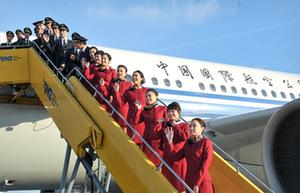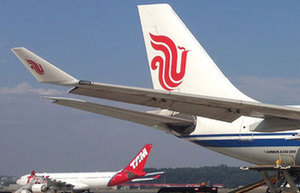In the past, fleets of aging planes and the absence of US networks kept Chinese airlines from competing with US carriers. But the situation is changing as Chinese airlines invest in new planes and form more international partnerships.
China Southern Airlines has put its flagship Airbus A380 on the Guangzhou-Los Angeles route and its Guangzhou-New York route will use Boeing 777-300ER aircraft that the carrier took delivery of this year.
Hainan Airlines also put its entire fleet of B787 planes-the world's newest passenger aircraft-into service in the North American market.
"After taking delivery of the B787 planes, Hainan Airlines has more competitive power to develop in the US market," said Liu Jichun, the director of the carrier's international business development department.
In the US, cooperation with local airlines, mostly through alliances that include many carriers, is the main way that Chinese airlines compensate for the lack of local networks. Through these alliances, Air China has code-sharing arrangements with United Airlines, while China Southern Airlines works with Delta Air Lines Inc.
Hainan Airlines isn't part of any alliance yet, but it has partnerships with Alaska Airlines Inc, JetBlue Airways Corp and American Airlines.
US-based airlines are acting to enlarge their networks in China, as well.
"China is one of the most important and fastest-growing international markets for United, so we will continue looking for opportunities to add capacity to this promising market," said Walter Dias, United Airlines' managing director for greater China and South Korea.
United Airlines operates direct service from five US cities to Beijing, Shanghai, Taipei, Hong Kong and Chengdu.
"The recent steady growth of the economy in China is creating a large middle-class segment of people who are willing to spend their disposable income for overseas travel," said Dias. "So we are very optimistic about business opportunities in China."
To attract more Chinese passengers, United Airlines offers special services, including Mandarin-speaking flight attendants and Chinese-style cuisine.
American Airlines, the world's largest carrier but a latecomer in the China-US market, also plans to expand its presence in China and obtain revenue growth of 67 percent in the market this year.
The airlines, which has only had a small share in the market thus far, is adding services that it hopes will propel revenue growth, said President Scott Kirby. It's aiming for double-digit revenue gains in China, in line with China's air travel market growth in recent years.
Besides China and US-based carriers, airlines from other countries, especially South Korea and Japan, also benefit from increasing Sino-US air travel.
The China market generates about 25 percent of the total income of All Nippon Airways Co Ltd, with 10 direct routes from China, said Abe Shinichi, ANA's chief representative in China. Chinese passengers transferring in Japan to the US are an important source of business for the Japanese carrier, and ANA also plans to explore more Chinese second-tier cities.
Airlines based in Japan and South Korea have obvious advantages in terms of price, because revenue from local passengers already covers their costs, and transfer passengers mean extra profit, some business insiders said.
"The airlines from Japan and South Korea are very competitive in the market," said an official of Hainan Airlines.
 |
 |
| Air China links Beijing, Washington |
